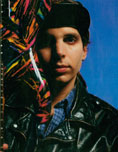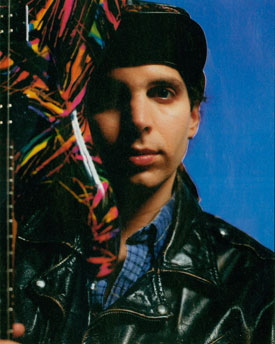Born to Burn: Joe Satriani


Born to Burn: Why I Play Guitar Originally printed in Guitar World, October 1992 Joe Satriani “My first experience with the guitar came when, between the ages of nine and 12, I learned how to play acoustic guitar by watching my sister Marion. I realized that, outside of her technical ability she had an emotional involvement in what she was doing, and when she performed, she would spread that feeling around and it was very natural. We were a very close family and it was like if she could do it, we all could do it. My parents were always encouraging us to paint, draw, or play music. I didn’t need to play guitar so I could get more girlfriends, or to rebel against my parents. I mean, there was nothing to rebel against, and my parents always encouraged me to be creative. So, for me, playing guitar was a fun thing, and it was the greatest experience I ever had growing up. “Two months after my 14th birthday, Jimi Hendrix died -- and after that I really committed myself to learning how to play guitar. The concept of him not being around anymore to make records was so horrible, and when he passed away, I didn’t know what to do. The only positive step I could take was to start playing in earnest myself -- to fill the void in my life. “For me, playing music was always just a feeling and being able to go with it. As time went on, I became more aware of the fact that a lot of these feelings I had could be translated into music. By the time I was a teenager these feelings were so strong that I knew I would have to link them to an instrument. My affection for Hendrix is difficult to explain, as are any emotional feelings and events in life. I remember listening to Hendrix records when I was very young, probably around 10 years old, and being transfixed. Listening to his music was a deep, cathartic experience that was a little embarrassing to talk about as a little kid -- I didn’t see anyone else my age flipping out when they put on ‘Third Stone from the Sun.’ I had to get ready to listen to that song, so I knew it was doing something to me. The first time I listened to it all the way through, I felt as if my heart and mind had just been put through the wringer -- and it’s difficult for a 10-year-old to put those feelings into words. To be able to listen to his music like that was like a gift from one human being to another. “I was totally obsessed with the sound of music and since I was a little kid I guess I didn’t pay close attention to details. When I’m really obsessed with Hendrix I tend to block out even the most basic things. For instance, back then I didn’t even know what a Fender Stratocaster was -- and it was right there, in front of my face. When I would put on those early Hendrix records, all I could think of was how I felt when I heard the music. I didn’t care about the amp or any of his equipment -- I just couldn’t believe that someone could make music like that. “The basic idea of creating hasn’t really changed for me over the years. There’s still the same anticipation, excitement and inviting feeling when know that some sort of inspiration is about to arrive. I still get off in the same way I used to. It’s like being in the country and knowing there’s a storm coming -- you can see it in the air and you can smell it. When that happens when you’re a kid, you know you have to get ready because it’s going to be a lot of fun, as well as a little scary. With music I know that something great is going to happen because the whole experience feels great. Of course, there is a lot of work that will go into it, and I will sink into horrible depths of momentary depression because I can’t find that last note or the missing chord. But, when it starts to come, creating is the greatest thing in the world. “After playing at the Guitar Legend Festival in Spain last year, I remember going upstairs to my hotel room and just wanting to weep -- probably because so many of my dreams had come true. But it was a good cry. The whole experience was great, and it was an extension of those feelings I had after playing for so many years. It relates right back to when I was a kid when I would kneel down in front of my record player and listen to ‘Third Stone from the Sun.’ “I think music is all context -- how you respond depends on what you’re trying to get out of it. There are certain times when I play something, and even though I know I rushed a beat here or messed something up there, I know it’s the real stuff. Other times, I feel the music is asking me to perform some incredible technical feat perfectly, and that’s the only thing that will work with that particular song. “For example, if you took Yngwie Malmsteen and put him in B.B. King situation, and took B.B. and put him in an Yngwie situation, in neither case would they satisfy the songs’ requirements. When someone puts on an Yngwie track I don’t think they’re looking for the profound depths of blues expression -- they’re looking to be set free by someone who plays with precision and fire. What I’m saying is that the first fan of the artist must be the artist himself. Only then can he hope to elicit a response from the audience and at the same time be happy with what he’s done.”
Get The Pick Newsletter
All the latest guitar news, interviews, lessons, reviews, deals and more, direct to your inbox!


![[from left] George Harrison with his Gretsch Country Gentleman, Norman Harris of Norman's Rare Guitars holds a gold-top Les Paul, John Fogerty with his legendary 1969 Rickenbacker](https://cdn.mos.cms.futurecdn.net/TuH3nuhn9etqjdn5sy4ntW.jpg)







